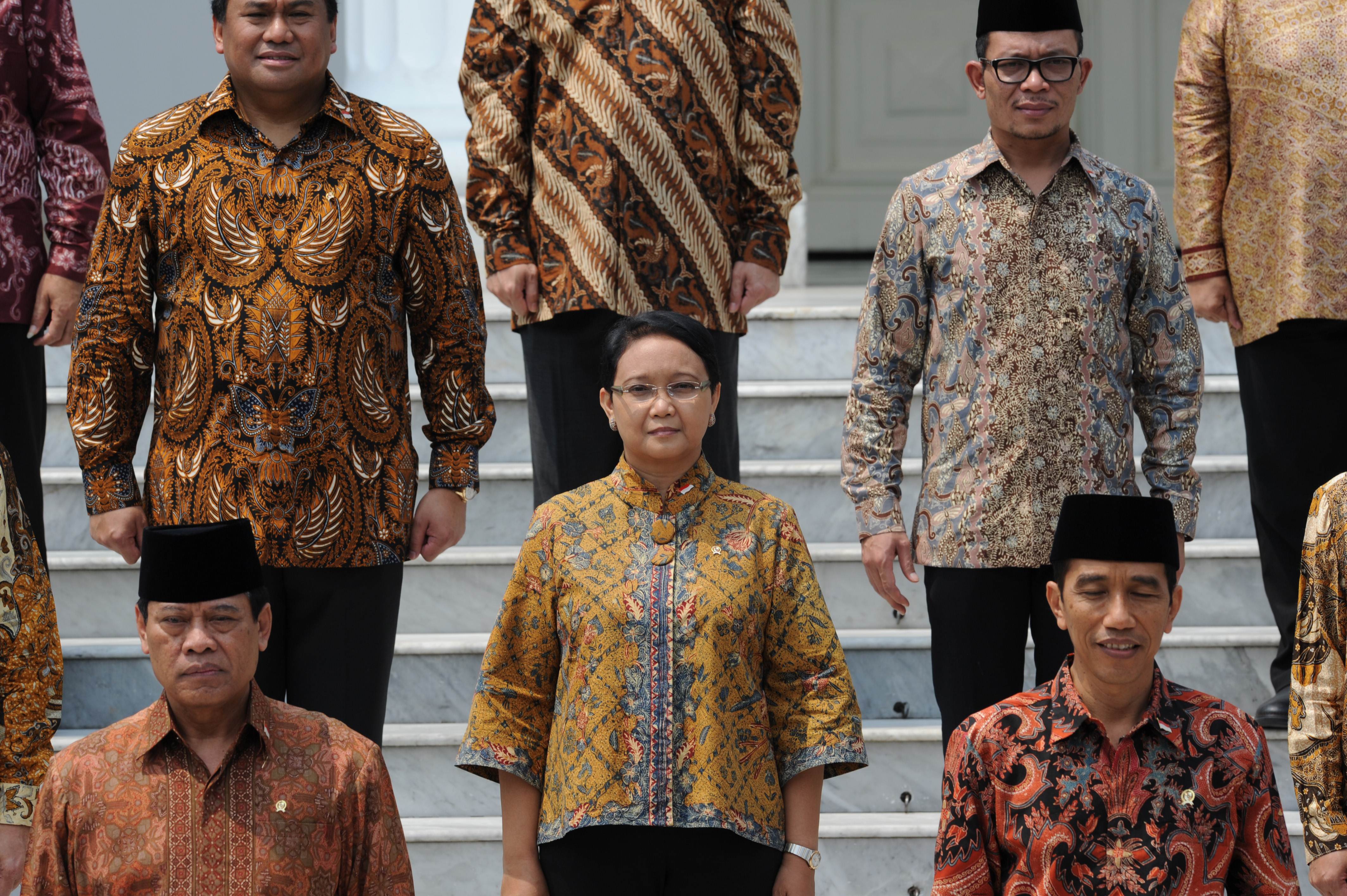Impressive Legacy: Joko’s choice of Retno Lestari Priansari Marsudito to succeed Marty as foreign minister is a break from tradition

Foreign Minister Retno Marsudi, center, is seen in between Coordinating Minister for Political, Legal and Security Affairs Tedjo Edy Purdjianto, front left, President Joko Widodo, front right,, Trade Minister Rahmat Gobel, back left, and Minister of Manpower Hanif Dhakiri, back right, during official inauguration at the Presidential Palace in Jakarta on Oct. 27, 2014. (AFP Photo/Romeo Gacad)
President Joko Widodo finally made public on Sunday his choice of presidential aides in a unique atmosphere and in an unusual venue, though still within the premises of Merdeka Palace. Among the new ministers in Joko’s cabinet lineup is Retno Lestari Priansari Marsudi, who replaces Marty Natalegawa as foreign minister.
The history of the nation’s international relations since 1945 has so far only seen male foreign ministers in the vital position, making Retno the first Indonesian woman to further this country’s interests abroad.
A Jakarta Globe report published in August titled “For Indonesia’s Foreign Minister Post, Best Man May Already Be in the Job,” projected that Marty would retain his seat — but Sunday’s announcement proved otherwise.
Retno must recognize, however, that her predecessor built an impressive legacy during his five years in office.
Joko’s choice of Retno was reported as being linked to her success in managing the issues related to Papua in the Netherlands and bringing Indonesian-Dutch relations on the right track during her stint as the nation’s envoy there.
However, the job of foreign minister is not only about putting the country’s bilateral relations back in order, but it is also about how Indonesia, under the new government, would continue to adhere to the belief that it needs to continue its international role, despite the possibility of fresh domestic flash points resulting from possible clashes of political interest.
Now that Retno controls Indonesia’s Ministry for Foreign Affairs, she will have to entertain a myriad of international problems the archipelago faces, both regionally and globally.
Retno will need to view Indonesian foreign policy from a much wider perspective and tackle new elements of the country’s foreign policy, whereas before she was only occupied with bilateral issues and those that fall under the directorate general for the United States and Europe.
The arrival of Retno as Indonesia’s chief diplomat will hopefully provide stronger impetus for her ministry to be more alert and more progressive with the country’s attempts to explore opportunities provided by the strategic changes on a global level.
What is more important for Retno is how she will inject maritime elements into her ministry’s agenda in a way that reflects Joko’s aspiration to turn Indonesia into a maritime axis.
Perhaps, Retno may not be of the same caliber as Marty in conducting the nation’s foreign relations.
So, especially as the first female to fill the post, Retno will need to prove her capabilities in making Indonesia a more proactive international force than before.
If Retno wants to appear different in her approach and management of foreign policy issues, she must realize that she is not alone in the domain of international relations; meaning that she will have to push her team in taking larger strides forward and put aside egos and rigid gestures, if faced.
She will also have to capitalize on the modalities that have been put in place by Marty.
Meaningful force
A well thought-out foreign policy should be initiated by Retno if Indonesia, under President Joko, is to be continually seen as a meaningful force, both strategically and politically, for the stability of the region.
This is the message Joko delivered to the public in his political platform.
For this, like Marty, Retno would have to introduce her own remedies as to how Indonesia, under the new administration, would help solve the country’s economic problems, strengthen its international standing and ensure that Indonesia would not blindly follow changes, but lead them.
As the first Indonesian woman to hold such a pivotal position, Retno will have to convince her male colleagues at the Ministry for Foreign Affairs that she is more than capable of effectively working alongside them and subscribe to a foreign policy that brings hope and light to pertinent areas.
Marty’s leadership in the field was indeed outstanding. What we expect to see from Retno’s brand of leadership is how her talents are to be put into effect and gear the country’s foreign policy to a stage Marty had yet to reach.
Top diplomatic figures, such as Yuri O. Thamrin, Desra Percaya and Havas Oegroseno, whose names were once circulated to replace Marty, are valuable, strategic resources to the Foreign Ministry.
This suggests that Retno will not only need to mobilize them in order to effectively translate President Joko’s foreign policy platform, but she will also need to forge a strong team — one whose opinions and perspectives she must accommodate and take into serious consideration.
Retno’s foreign policy agenda is regarded as reliable and acceptable only if it is comprehensive in scope, realistic and modest in its objective, the result of teamwork and reflects the country’s long-term needs.
Time will tell whether Retno can make a solid impact in pursuing Indonesia’s foreign policy, especially in a completely new domestic setting, and can exhibit the sense of what happened inside the country as well as our immediate region.
Bantarto Bandoro is a senior lecturer at the School of Defense Strategy, Indonesian Defense University and founder of the Institute for Defense and Strategic Research in Jakarta. He is the author of Indonesia’s Prescriptions For Regional Security (2014)
